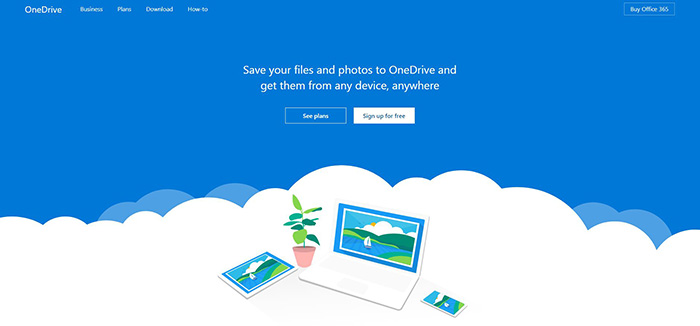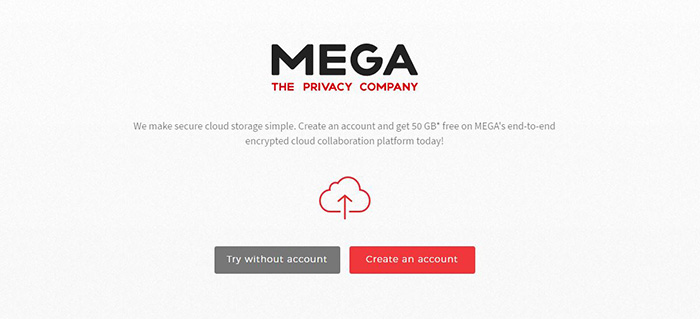
Free Cloud Storage Services 2018 – The Best Four Options!
A few weeks ago, I noticed my wife emailing a document that she was working on to herself. Responding to my surprised question, she explained that she needed to continue working on the document elsewhere, and emailing herself was the best solution she had. While that particular incident led to her first encounter with the world of free cloud storage services, a vast majority of computer users either don’t understand the importance of online file sharing solutions or don’t use them despite knowing.
In this article, we’ll take a look at why you need an online file storage solution, the difference between cloud storage and backup, and our top 5 picks of the very best free cloud storage services. Without further ado, let's jump right in.
Free Cloud Storage Services: Why You Need One?
The better question would be “why won’t you,” because there’s an abundance of free cloud storage services that offer a great set of features. These are designed to provide backup of your files and data, allow for sharing and collaboration, enable universal access either through client apps or Web versions, and have generally better data security than what you’d have just on your own computer.
In a nutshell, if you want your data to be securely stored and accessible wherever you want, you need cloud storage.
A Word on “Free” Cloud Storage
While we are here recommending the top free cloud storage services, you need to understand that there’s no “truly free” cloud storage. Servers, backup drives, and infrastructure all cost money, and so do the people who help develop these services. Hence, most cloud storage solutions work on the freemium model, where they offer a limited feature package sans cost, while more storage space and advanced features will require opting for a paid tier.
Cloud Storage Vs. Cloud Backup: What’s the Difference?
The line between cloud storage and backup services is getting blurrier, but there’s a fundamental difference of approach. The primary purpose of cloud-based file storage services is storing your data with emphasis on universal accessibility, sharing, and collaboration. Therefore, these services generally offer limited storage space and better features, like two-way sync capabilities for one “synced” folder on your local drive that communicates with the server.
Cloud backup, on the other hand, is about providing a secure, redundant storage for the bulk of your data. Hence, they generally offer more storage and focus more on one-way uploads than syncing changes back from the server to the client. These solutions are also more geared towards mirroring the entire hard drive on the cloud server as opposed to one directory. For more information, you can read TechNadu's overview of the best cloud backup software.
Best Free Cloud Storage Services – Top Recommendations
Finally, let’s take a look at which online file storage services we think are the best, and why. All of these services are robust and well reputed, so our emphasis will be on recommending these services based on best use cases.
Option #1: Google Drive — Best Overall
Google Drive takes the prize in our ranking owing to a number of features. Having Google’s solid backing at its foundation, Drive has grown to become not just a cloud storage solution, but part of an ecosystem that offers photo storage (unlimited for regular photos), email, online office suite and much more.
In the free version, Google Drive offers 15GB of storage that’s shared across the Google Suite. The Web interface is capable enough, and if you opt for the desktop apps, you get a native folder on your hard drive that syncs with the cloud. On Android and Chrome OS, the Google Drive apps come natively, while iPhone users can get it from the iTunes App Store.
The only downside to Google Drive is that the Mac and iOS apps (and consequent integration) aren’t as impressive as they are on Android and Windows.
Google Drive doesn’t require a dedicated sign-up; if you have a Google Account, just navigate to the official website linked above to start using.
Option #2: Dropbox — Overall Runner-up
Dropbox is one service that did online storage before cloud storage solutions were cool. Dropbox has been around since 2007 and offers client-based online sync services using dedicated apps for the platforms it supports. And that support is pretty abundant, too, with clients for every major mobile and desktop platform available.
Dropbox’s biggest strength lies in its robust and powerful web interface, which is among the best ones out there. The native file viewer can handle several file formats for previews. Comments and version control enable excellent collaboration features. While Dropbox lacks the power of something like Google Apps, their “Paper” product makes it a worthy offering for business users as well.
Dropbox’s Achilles’ heel is its 2GB storage that comes with free accounts. Back in 2007 when Dropbox started, this was a generous amount, but it seems the service has been unable to evolve in this area, making it one of the primary reasons it comes in 2nd on our list. The saving grace is that free users can complete certain tasks and refer friends to earn more free storage, up to a maximum of 16GB.
Dropbox doesn’t offer too many tiers of paid storage. There’s Dropbox Plus that comes at $10/month (or $99/year) for 1TB of storage space, or Professional starting at $20/month with the same amount of storage but with additional features.
Option #3: OneDrive — Best Windows/Office Cloud Storage
There’s hardly a cloud storage service that’s gone through as much “evolution” as OneDrive. Formerly SkyDrive, Windows Live SkyDrive and even Windows Live Folders, this service really shows the fruits of growth over the years that it has existed. Over the years, it was powered further by Microsoft’s rather-recent shift in strategy of approaching software as a service (SaaS). The result is an online storage and backup solution that’s deeply integrated into Windows 10 (especially), works natively with Office 2013 and 2016, has excellent two-way sync capabilities and much, much more. All of this with a decent 5GB of free storage.
Similar to Google Drive, OneDrive is an integral part of Microsoft’s online services. Hence, if you have a Microsoft account (or Hotmail, or Live), you already have OneDrive. With Windows 10, it’s already built into Windows, but other versions and operating systems will need a client download. Similar to other cloud storage services, OneDrive also syncs one particular folder on your hard drive to its servers, whereby they can be accessed online, through other linked computers, the web interface or from mobile apps.
OneDrive offers various storage tiers starting at $2/month for 50GB. The best value, however, comes from getting an Office 365 Personal subscription, billed at either $6.99/month or $70 annually. This way, not only you get the latest Office Apps for Mac and/or Windows, but also a whopping 1TB of OneDrive space!
Option #4: Mega — Secure & Most Storage for Free
Mega started as MegaUpload back in the day and went through a series of litigations before relocating to New Zealand and becoming a free cloud storage service with an emphasis on security. Hence, any file that gets uploaded to Mega goes through end-to-end encryption, making it one of the most secure cloud storage services out there.
On top of that, Mega shines in the amount of free storage that it offers: a whopping 50GB. Furthermore, installing the desktop client/mobile apps and inviting friends results in more free storage, albeit for a limited time. There’s real-time collaboration in Mega as well, though not as robust as Google Drive or OneDrive. Mega alone offers browser extensions for Chrome and Firefox, enhancing the web experience with better features, speed, and security. There’s no Mac client, however.
Mega’s drawback comes from its bandwidth limitations in file transfers. Free accounts get 5GB bandwidth for file transfers which refills every 30 minutes, and that might be fine for most users. However, if you’re going to use Mega for file hosting and distribution, or you have large file sizes, you might need to invest in paid tiers, which increase the transfer bandwidth to 1TB per refresh cycle at the base level.
Speaking of that, Mega’s paid accounts start at €5/month for 200GB and 1TB transfers, going to €30/month for an impressive 8TB storage and 16TB transfers!
Final Words
The free cloud storage services covered in this article barely scratch the surface of what’s available out there. However, these options should suffice the needs of most users, and we hope you found these useful.
If you think there’s another must-have service that should’ve been on the list, or you have a question, feel free to leave us a comment. And, if you found it useful, share it across your social networks. Thanks!

















